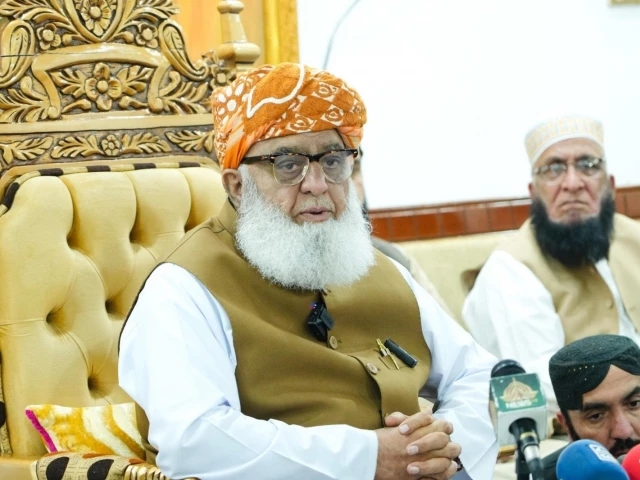Rehman criticized the 27th amendment process and claimed that the government did not consult the opposition
JUI-F chief Maulana Fazlur Rehman addresses a press conference in Peshawar. Photo courtesy: JUI/Facebook
Jamiat Ulema-e-Islam (JUI-F) chief Maulana Fazlur Rehman criticized the 27th constitutional amendment, describing its passage as “forced and illegitimate” and saying it did not enhance the stature of those who pushed for it.
Addressing a press conference during a JUI-F Shura meeting on Tuesday, Maulana Fazlur Rehman said the assembly had also reviewed several laws recently passed by parliament. He said the party had completely rejected the 27th amendment and that its parliamentary members had opposed it, and the Shura backed its position.
The 27th Amendment, passed in the National Assembly and the Senate by a two-thirds majority, made 59 changes to the Constitution. The changes include the establishment of the Federal Constitutional Court, changes in the military command structure, immunity for the President of Pakistan and amendments to Article 199, which concerns the transfer of judges.
He pointed out that during the 26th amendment, JUI-F kept Pakistan Tehreek-e-Insaf (PTI) informed of every development and even forced the government to accept the PTI’s proposals. “This amendment,” he added, “was subjected to a process of mutual consultation and was approved in Parliament with relative consensus.”
Rehman criticized the 27th amendment process and claimed that the government did not consult the opposition, particularly JUI-F. He described the two-thirds majority used to pass the amendment as “strained and false”, arguing that it violated parliamentary rules and democratic principles. He added that the move had caused a rapid decline in the government’s popularity.
Read: President signs 27th amendment bill into law
He also claimed that the 26th amendment had caused MPs to reluctantly approve measures that the government had initially abandoned, creating complexities that even the courts found difficult to interpret. He said JUI-F had consistently supported the constitutional court in principle.
Rehman further accused the Pakistan People’s Party (PPP) of acting against the democratic spirit, stating that despite having a two-thirds majority, it consulted smaller provinces and then supported an undemocratic process.
He criticized provisions granting lifetime immunity to certain officials and questioned why former President Zardari, who had spent eight years in prison, was now protected from prosecution.
Read more: JUI-F rejects the 27th Amendment
On the military leadership, Rehman acknowledged the bravery of the chiefs of the three armed forces against India, but argued that the lifetime privileges granted to them under the amendment were “unsustainable in a democratic society” and risked creating a class-based system. He suggested that the military should give up these benefits.
Rehman concluded by highlighting that enacting laws contrary to the principles of equality undermines democratic norms. He stated that the Islamic Republic of Pakistan was founded on the Quran and Sunnah, and that according to the law, all people must be treated equally, echoing the founding principles of Muhammad Ali Jinnah.
The JUI-F Khyber-Pakhtunkhwa chapter also rejected the 27th Constitutional Amendment on November 19, calling it “a conspiracy against the Islamic Constitution and contrary to national interests.”
The party also announced that a provincial-level Khatm-e-Nabuwwat conference will be held in Mardan on December 14, where JUI-F chief Maulana Fazlur Rehman will deliver a keynote address and reveal the party’s future course of action.




